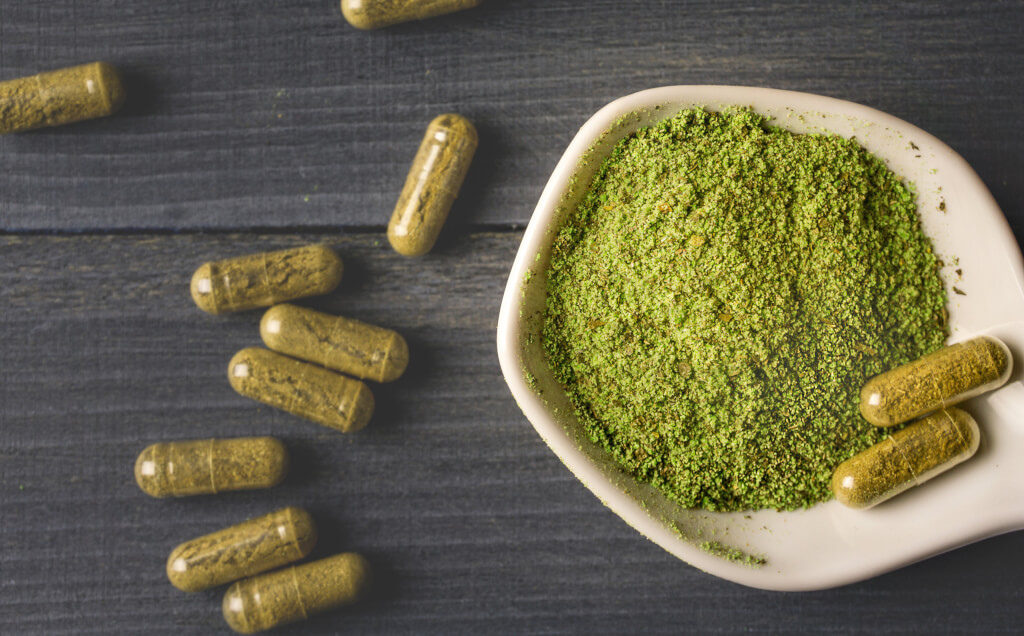In the past several years, a tree from Asia has become the source of a new way for people in the United States to get high. But is Kratom addictive? Kratom now shows up regularly as a drug that causes a high normally obtained from using illegal narcotics.
What Is Kratom?
Kratom is a tropical tree native to the Southeast Asia region. Kratom is also known by names including ketum, thang, thom, and kakuam. When the leaves from a kratom tree are ingested, they have the effect of a psychotropic mind-altering substance.
Psychotropic drugs are defined as drugs that affect a person’s mind, behavior, and emotions. They can be legal, such as prescription drugs used to treat mental health issues. Psychotropic drugs also fall under the heading of illegal, such as cocaine and heroin.
Most people take kratom as a pill, capsule, or extract. The leaves can also be chewed, smoked, brewed as tea, or mixed into food and consumed. People in Southeast Asia have often used kratom as a holistic medicine of sorts. When taken in small doses, it acts as a pain reliever. It also treats medical symptoms such as fatigue, diarrhea, and coughing.
Is Kratom Legal in the U.S.?
Kratom has been declared illegal in many countries, including Australia and many of the European Union countries even though people are still wondering, “is kratom legal?”. In the United States, while kratom currently is still legal, the Drug Enforcement Agency (DEA) has determined it to be a “drug of concern”. This category includes any drug or substance, including controlled ones, that have the potential for abuse and are being monitored by the DEA.
While kratom is not banned nationally, some regions in the U.S. have banned its use. It is legal to purchase kratom over the internet. Many sources sell it, although buying it online involves risk. Online sellers do not have to provide proof that their products are not contaminated. Like many illegal drugs in the U.S., kratom sold online may be laced with products, many of them deadly.
What Happens When a Person Takes Kratom
Kratom has caught on in the U.S. as a party drug being used by individuals in order to get high. It can be taken to achieve the effects of using opioids and stimulants. Small amounts of kratom produce stimulant-type effects, including feeling more alert and increased energy. People who use kratom this way often report feeling more sociable.
Larger amounts of kratom fall more into having the effects of an opioid. Users tend to experience feeling sedated, an increase in pleasurable feelings, and a decrease in pain.
Is Kratom Addictive?
Addiction treatment centers are seeing an uptick in the number of patients who enter their programs addicted to kratom. What may have started out as an honest attempt to enjoy holistic benefits by using small doses of the drug occasionally can get out of control. But, is Kratom addictive? Yes, as some people mistake kratom for a safe narcotic due to its legal status. But, this type of use can lead to addiction.
Signs that a person may have become addicted to kratom include:
- Nausea
- Loss of appetite
- Constipation
- Dry mouth
- Sweating
- Itchy skin
- Weight loss
- Increased urination
- Seizures
- Delusions
- Confusion
- Hallucinations
A person who develops an addiction to kratom will need professional help to quit this drug. Detoxification programs, commonly known as “detox”, can assist a person who experiences difficult physical and emotional symptoms. When detoxing from kratom, side effects can include:
- Runny nose
- Watery eyes
- Muscle aches
- Hot flashes
- Sweating
- Shaking
- Insomnia
- Jerky body movements
- Mood swings
- Aggression
- Hostile reactions
- Depression
- Anxiety
- Cravings for kratom
These symptoms typically begin within 12-48 hours of the last time a person used the drug, and they last 3-4 days. The amount of time experiencing withdrawal symptoms depends on how long an individual has abused the drug and at what dosage levels.
Can a Person Overdose on Kratom?
Studies on kratom are still in their infancy stages in the U.S., but most lack statistics that show that using kratom alone can cause an overdose or death. Overdoses involving kratom mostly happen when a person also ingests one or more other narcotics, such as alcohol, cocaine, fentanyl, and benzodiazepines. Some overdoses and deaths happen when an individual consumes kratom that is laced with another dangerous substance, often unknown to the user.
What to Do If You Experience Addiction to Kratom
If a person suspects they may have developed an addiction to kratom, they need to take action. They can schedule an appointment with their doctor and discuss how long they have used the drug, at what dosage, and for what reason. The person can also contact detox facilities and addiction treatment centers to inquire about what programs they have to assist with going off kratom. Attempting to detox alone can be dangerous, making it important to have professional help.
Detox in California
MD Home Detox provides a personal detox service in the comfort of your own home. You will be monitored by a doctor and provided with round-the-clock nursing care to ensure your physical wellbeing and provide any needed medications. Detoxing at home provides you with confidentiality and being in familiar surroundings. We offer options like grocery shopping, a nutritionist, sober companions, and access to therapy.
If you would like more information about our program, call MD Home Detox at (888) 592-8541 or click here. We are happy to answer any questions you have.

